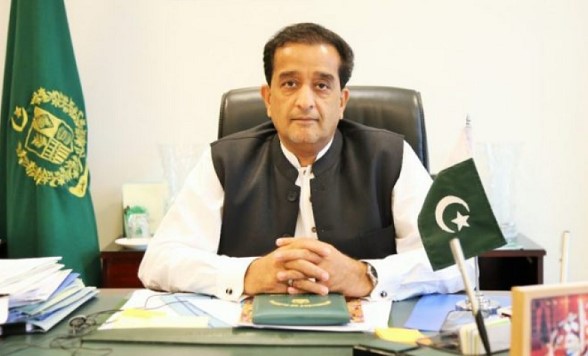Pakistan and China cooperating on Climate Change: PM’s aide

Islamabad: Special Assistant to Prime Minister on Climate Change Malik Amin Aslam has said that Pakistan and China were cooperating on Climate Change.
Speaking at a news conference here at the Pakistan-China Centre, Aslam pointed to the all-weather friendship between Pakistan and China.
“Like all other sectors, China is also cooperating on the Climate Change. We have a lot to gain from China’s experience,” he maintained.
Aslam’s comments came after Pakistani Prime Minister Imran Khan recently said that Pakistan had a lot to learn from China’s experience in addressing climate change issues.
“China has come a long way in its fight against climate change and environmental degradation, and Pakistan will benefit from China’s experience including the use of new techniques to counter climate change at home,” the PM had stated at a recent special event organized by Pakistan’s Ministry of Climate Change.
He had also stressed that Pakistan “will take a leaf out of China’s book on the successful greening of degraded grasslands and deserts.”
Aslam announced that Pakistan is aiming to bring down the national carbon emissions by 50 percentby year 2030 from the business as usual levels.
The ambitious goal of curbing the country’s future carbon emissions has been set under the revised Nationally Determined Contributions (NDCs), a climate vision, approved by Prime Minister Imran Khan on October 13, 2021, to be submitted to the UN Framework Convention on Climate Change ahead of UN global climate conference starting from November 1 in Glasgow, Malik Amin informed.
Though this is ambitious but achievement goal that would be attained through moblisation of local and is strictly conditional to the availability of international funding resources with the assistance of various UN-supported funding channels including Green Climate Fund, he added.
Pakistan, he underscored, was willing to grow along a climate friendly trajectory but the world needs to now match their words with action and deliver the climate finance necessary to make this clean transition.
“PM Imran Khan has fully supported and approved the ambitious goal of mitigating planet warming carbon emissions to address various climate change-caused disasters including floods, heat waves, cyclones, and glacier melting, being faced by the country,” he revealed.
Aslam indicated that Pakistan had been placed 5th on Global Climate Risk Index, though Pakistan’s contribution to global GHG emission was less than 1%.
“Though Pakistan is not responsible for the climate disaster it is ready to step forwards. And be a part of the global solution and implement adaptation and mitigation measures in various sectors including forestry to address the risks associated with climate change,” he mentioned. Spelling out details of the roadmap for shifting the country’s carbon emissions levels on to a lower trajectory, the PM’s aide remarked that while 15 percent reduction in carbon emissions would be made through country’s own resources, 35 percent heat trapping emissions’ reduction would be subject to availability of international financial support from various available funding channels such as Global Climate Fund.
He recalled that the country’s annual carbon emissions in year 2018 stood at 489.87 MtCO2e, less than one percent of the global carbon emissions.
“But Billion Tree Afforestation Programme of the Khyber Pakhtunkhaw (provincial) government and the Ten Billion Tree Tsunami Programmed of the federal government alone would sequester around 500 Mt CO2e carbon emissions by year 2040, if implemented fully,” he emphasized.
The PM’s aide detailed that 60 percent of all energy produced in the country would be generated from renewable energy resources by 2030 and 30 percent of all new vehicles sold in Pakistan in various categories would be electrically-powered, a goal that would be achieved by the year 2030.
“As far as coal is concerned no new imported coal power plants would be let in the country anymore and two new coal fired power plants would be shelved in favour of hydro-electric power,” Aslam contended. He highlighted that Pakistan’s financial needs for adapting to the impacts of climate shocks stood between US $6 to US $14 billion per annum, direly needed to protect lives and livelihoods and ecosystems from devastating impacts of the climate crisis.
Spelling out national green programmes launched to cut the country’s earth-warming carbon emissions, Malik Amin Aslam shared that various green initiatives have been already in place launched as a part of the PM Imran khan’s vision for clean green Pakistan.
“These include Ten Billion Tree Tsunami Programme, Miyawaki Urban Forest Project, Clean Green Pakistan Movement, Protected Areas Initiative, National Park Initiatives and Ecosystem Restoration Initiative,” he elaborated.





